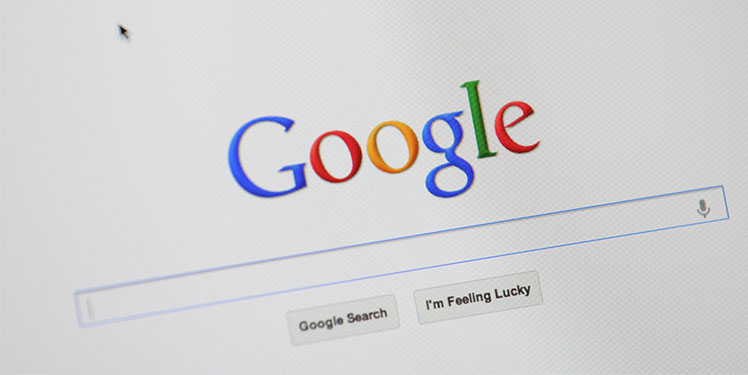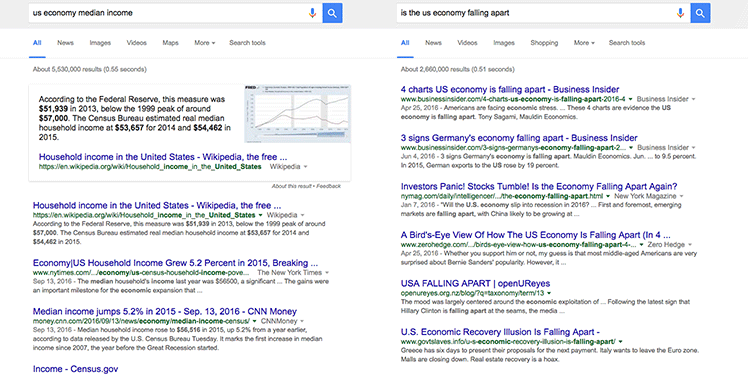How to get unbiased news on the web

Every day, we are hit with a drudge of information. We get it from social media, from the radio, from our TVs, etc. But with all this information, sometimes it is very difficult, if not impossible, to dig out what is true and what is biased or entirely made up on the internet.
The following are some general guidelines I use when finding information, or when confronted with stories I read on the internet— to try and suss out the truth in any given situation. While not perfect, and certainly we all have our own implicit bias we face, these guidelines help me search for baseline information to inform my viewpoints. Hopefully, these will help you find less biased information in your daily lives as well.
1. Biased searches result in biased results
When we insert bias into our searches, the output tends to be biased. Google and other search engines have algorithms that respond with what we are searching for. If our search is for evidence to a point, it will respond with evidence supporting that point. If we search for general information around that topic, it will respond with general information around that topic.
Take for example, the topic of the United States economy. I searched today for two different topics, "us economy median income" and "is the us economy falling apart". The first one is looking for information, and does not include bias. Google responded with reports from wikipedia, the New York Times, CNN, and the US Census Bureau. All give straight-forward information on what the median income is currently. The second search gave articles from Business Insider, New York Magazine, Zero Hedge, Open Your Eyes, Government Slaves, and The Blaze. Of those, Business Insider gives advice, NY Mag is an analysis piece, Zero Hedge/Open Your Eyes/Government Slaves are all highly biased "alternative news" blogs, and The Blaze is a news/entertainment network founded by Glen Beck.

Now, these two searches aren't exactly looking for the same information— but they do illustrate the point that a biased search will give you a biased result.
2. Wikipedia is a great starting point
If you are looking for information on a topic, Wikipedia is a great place to start off. While Wikipedia is not devoid of bias, there are legions of editors on Wikipedia that try to remove or at least mark articles that bias can be present.
But the most useful part of Wikipedia are the sources that are listed. For many articles, there will be a long list of primary or secondary sources listed as footnotes on the bottom of every article. If you are looking for information, check out the sources that are listed by Wikipedia for more information related to the topic, and to understand where the author was getting their own information from.
As always, be a little guarded as Wikipedia articles are written by the community. Since anybody can update Wikipedia, there can be errors that get pushed through. However, his is far less likely for popular topics since there are many eyes and editors checking on them constantly.
3. News from social media is biased
This week, the Wall Street Journal posted an excellent infographic showing the differences between a "Blue" feed and a "Red" feed. On Facebook, Twitter, Reddit, and most other social media platforms— we will encounter a strong bias based on our friends, followers, and sub-reddits. Even if there are primarily unbiased sources on these platforms, it is inevitable that even the stories are limited to ones representing a particular viewpoint.
To combat this, have a set of news sources that you go to regularly. I listed mine in a previous post, but choose yours based on the type of news you like to read about. Instead of getting only the news articles found within your group of friends, use this to branch out and read more general stories on the day.
4. If you don't recognize it, don't trust it
At least once a week I see a news source that I do not recognize. Most of that time, the source is a satirical site or highly-biased personal blog masquerading as a real news source. Some of these sites hide their aim fairly well, and will take a good amount of time to prove that they are far from legitimate.
In order to combat this, if you do not recognize the source— don't trust it. Buying a domain and setting up a basic website takes less than $100, and in many cases just a couple of hours (if not less). With how easy it is to start a project, it is no wonder that these sites are coming up more and more often*.
5. Always look for more than one source
Partially to point #4, but when you find news that seems exaggerated, look for a secondary source. If there is only one site that is posting it, and that site is not one that has a known reputation you trust, chances are it is not true. Looking for multiple unbiased sources at least helps to weed out articles that are very biased, or possibly completely untrue.
6. User submitted content is easily manipulated
Online polls, comment sections, and other forms of user-submitted information can easily be manipulated. This can either be from having limited sample from which to take a survey (e.g. a poll taken on Fox News or The Slate will probably not be an accurate representation of the US population) or it can be from bots/individuals pressing for votes in a specific direction. A good example of the latter is how an online survey voted to name a Royal Navy ship "RSS Boaty McBoatface". Since rarely any of these are done in a scientific manner, they should all be read with a grain of salt.
The same is true with comment sections on the internet. Conservative sites will have conservative comments (mostly), liberal sites will have liberal comments (mostly)— and trolls or other bad actors can easily flood comments with absurd comments. Seeing a drove of comments in one direction or the other does not mean that popular sentiment resides in one direction or another, in fact it will rarely if ever be able to predict actual sentiment.
7. Use your best judgement, and don't trust the headline
Remember what your parents always said, "If it sounds too good to be true, it probably is." Use your best judgement when reading headlines on the internet, and always question what you are reading. Often headlines are made to be sensational— if not entirely accurate. Read the actual article they link to, and many times— read the article that the article links to as their source. Many of these third party sites will give you
There will be no perfect set of rules that can help distinguish bias, but stepping back and having a critical eye will help anybody find less biased information. Let me know if you have any other advice to find less biased information in the comments below.
* As a sidenote, I am working on a project to help identify clickbait better. It is slow moving, but if you have interest in helping let me know.